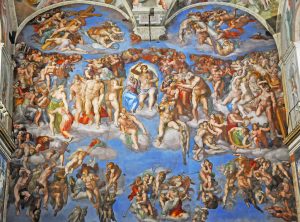Dear Jerry:
I had no intention of writing you again this soon but after having dinner with your brother the other day and picking up a copy of a booklet you gave him entitled Studies In Contrasts: The Doctrine of Salvation (by Herb Vander Lugt and published by the Radio Bible Class, Grand Rapids, MI.), I thought I’d drop you a short note. I was not surprised, but I was again disappointed in the obvious dishonesty (or ignorance) and the unfounded assumptions of the booklet. I decided to write a short note to ask you a few questions to see if you agree with me.

-
Save
But first, before we look at John 5:28, 29, let’s take a look at the contrast that Herb Vander Lugt sets up. He says under the heading Explanation: “. . . we are told that all people, believers and unbelievers [here is his contrast] will be resurrected and appear before Christ for final judgment.” He makes the opposing categories believers and unbelievers, but this is not what the Bible says. What contrast does the Bible set up? This booklet is written by those who are supposed to be the “Bible-people” who do not interpret the Bible on the basis of “tradition” but objectively, based on the supposed perspicuousness of the Scriptures. Let’s see how honest they are, or how blinded by their tradition they are . . .
If the reader goes to the text box to read the passage of Scripture referred to, they will find this: “The hour is coming in which all who are in the graves will hear His voice and come forth . . . to the resurrection of life, and . . . to the resurrection of condemnation.” John 5:28, 29. Now, what do the three periods ellipses ( . . . ) delete from the text? An ellipsis is defined as by the American Heritage Dictionary as “The omission of a word not necessary for the comprehension of a sentence.” The unwary reader might expect believers and unbelievers to be the words cut out. Am I correct? This is of course what the author expects you to read and understand. He deceives his readers.
Yet, get your Bible out and read for yourself the words of our Lord that the author “cut out” or deleted.
“Marvel not at this: for the hour is coming, in the which all that are in the graves shall hear his voice, And shall come forth; they that have done good, unto the resurrection of life; and they that have done evil, unto the resurrection of damnation” (John 5:28, 29).
My question to you is this: why did he remove words to hide the meaning of what our Lord Jesus was saying? And why do you condone such actions by believing and perpetrating the material?



This Post Has 3 Comments
Faith in Christ is a prerequisite for salvation. Hebrews 11:6 says: “But without faith it is impossible to please him: for he that cometh to God must believe that he is, and that he is a rewarder of them that diligently seek him.” Whatever else the Bible says about pleasing God, faith is a requirement.
STEVE RAY HERE: No one will argue with you on that point, but my point is that your faith better be living faith that produces good works, because it is by your works you will be judged.
But, Steve, if we are judged on our good works, isn’t that saying we can earn our way to heaven? And we have been told that we cannot earn our way, because we are already saved by Jesus’s death on the cross. I am very confused about this issue and would appreciate more clarification.
God’s Gal: We do not initiate our salvation with good works. That is a purely gratuitious gift of God. It is by faith and baptism based on the death of Jesus Christ. However, once you are “saved” you are required to obey and serve the Lord. We will be judged on how obedient we are. But all of it is based on the merits of Jesus Christ.
If my grandson wants to buy me a Christmas present he comes and borrows $100. I give it to him. He buys a beautiful present for me. Who paid for the gift? He or I? It is that way with God. He saves us by faith and baptism and then expects us to do something with the grace he has given us.
Comments are closed.